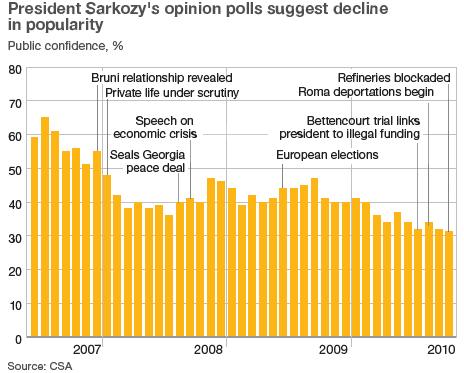French police frustrated by new strike blockades
- Published
The BBC's Christian Fraser says the French government has authorised the use of a special intervention force to deal with protesters blocking fuel depots
French strikers have tightened fuel blockades, hours after security forces began clearing protesters from depots.
Police reopened three sites in western France overnight, after ministers ordered that all of them be lifted.
But protesters against the government's pension reforms later returned to one of the fuel depots and imposed a new blockade in the south.
In Paris, masked youths clashed with police in the suburb of Nanterre and students gathered outside the Senate.
The upper house of the French legislature is due to vote on raising the retirement age later this week.
Transport workers are continuing their protests and the national rail operator, the SNCF, said one in three high-speed TGV trains had been cancelled.
President Nicolas Sarkozy has insisted he will press ahead with plans to raise the retirement age from 60 to 62 and the full state pension age from 65 to 67.
Across the country, one in four fuel stations has run dry. MPs were told that 3,190 were still empty on Wednesday. The number on Tuesday was closer to 4,000.
All 12 refineries on the French mainland have been affected by strike action.
Interior Minister Brice Hortefeux authorised use of the paramilitary police to break blockades at fuel depots. He said he respected the right to protest, but that did not include the right to block workers or to commit pillage or violence.
The BBC's Christian Fraser said this force was the equivalent of a Swat team whose normal duties include hostage rescue.
In the early hours of Wednesday, riot police lifted the blockade at three fuel depots, in Donges, La Rochelle and Le Mans. However, strikers reimposed their blockade at Donges.
In the south of the country, unions blocked the fuel depot at Trapil, which supplies civilian and military airports in the region, but were later said to have left the site of their own accord.
Our correspondent said the unions and the government were engaging in a game of cat-and-mouse over the fuel blockades.
In a separate development, striking workers were reported to have stopped gas from being injected into the country's network from three out of 12 storage sites.
The Sud Energie union said the three facilities represented about 60% of France's gas storage capacity.
About 300 striking workers staged a protest at France's main airport, Roissy-Charles de Gaulle in Paris, blocking access to the main terminal building. They sang the national anthem before pushing through a police barricade and marching through the building, blowing whistles and waving flags.
Protesters also blocked the main road leading to one of two terminals at Orly airport in Paris, then blocked the road to the other terminal, according to the Paris airport authority.
The unions said the airport at Clermont Ferrand in central France had been shut down and reported disruption at airports elsewhere.
'Unacceptable' violence
There has also been further sporadic violence in areas affected by disturbances earlier in the week.
In Nanterre, youths smashed shop windows and threw stones while in Lyon there were skirmishes between rioters and police.
Mr Hortefeux, who later visited Lyon, condemned the violence, saying it was "unacceptable" that more than 60 police officers had been injured.
On Tuesday, unions called a sixth national day of protest since the return from the summer holidays in September.
About 1.1 million people took to the streets, the interior ministry said; the CGT union put the number at 3.5m.Despite the widespread disruption, the strikers continue to attract popular support, with one opinion poll suggesting that 71% of those surveyed back the industrial action.
President Sarkozy's poll ratings appear to have dropped even further as he tries to tackle the wave of protests.
One poll for BVA conducted on 15 and 16 October suggested his approval rating was down to 30%, the lowest for three years.
The number of French with either a negative or very negative opinion of their president rose five points from September to 69%.

- Published19 October 2010
- Published10 November 2010
- Published19 October 2010